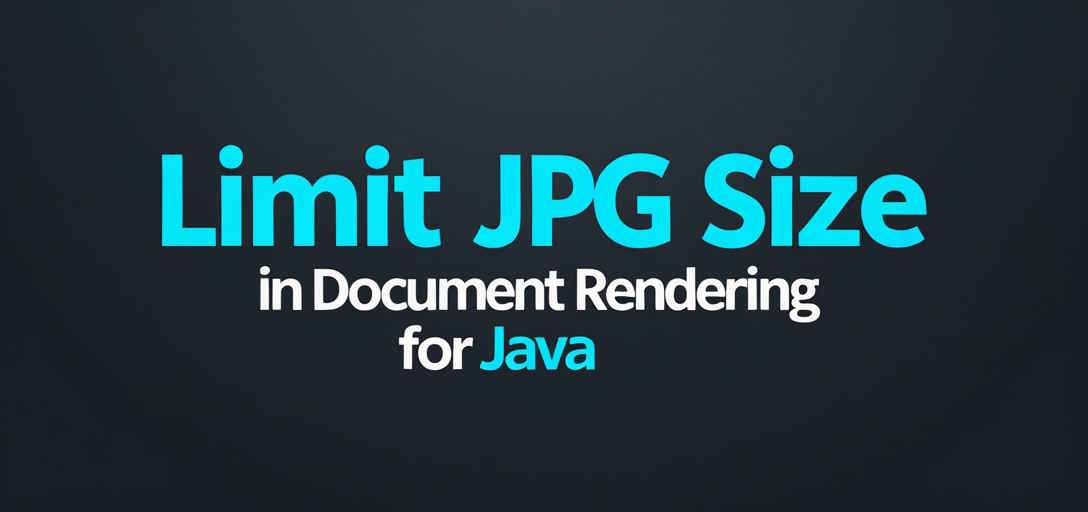How to Limit JPG Size in Document Rendering Using GroupDocs.Viewer for Java
Introduction
In today’s digital world, efficiently managing document rendering is crucial for businesses aiming to streamline operations and enhance user experience. One common challenge developers face is controlling the output size of rendered images when converting documents to JPG format. This tutorial addresses this issue by demonstrating how to set an image size limit using GroupDocs.Viewer for Java.

What You’ll Learn:
- How to configure GroupDocs.Viewer for Java
- Implementing image size limits in document rendering
- Best practices for optimizing your document management system
With these insights, you’ll be able to tailor the output of your document renderings to meet specific requirements. Let’s dive into the prerequisites before getting started.
Prerequisites
Before implementing this feature, ensure you have the following:
- Required Libraries and Dependencies: GroupDocs.Viewer for Java library version 25.2.
- Environment Setup: A working Java development environment with Maven configured.
- Knowledge Requirements: Basic understanding of Java programming and familiarity with document processing concepts.
Setting Up GroupDocs.Viewer for Java
To get started, include the GroupDocs.Viewer dependency in your project using Maven:
<repositories>
<repository>
<id>repository.groupdocs.com</id>
<name>GroupDocs Repository</name>
<url>https://releases.groupdocs.com/viewer/java/</url>
</repository>
</repositories>
<dependencies>
<dependency>
<groupId>com.groupdocs</groupId>
<artifactId>groupdocs-viewer</artifactId>
<version>25.2</version>
</dependency>
</dependencies>
License Acquisition
To fully utilize GroupDocs.Viewer, you can:
- Free Trial: Download and test the library using a temporary license from GroupDocs Free Trial.
- Temporary License: Acquire a no-cost temporary license for more extensive testing at GroupDocs Temporary License.
- Purchase: For long-term use, purchase a license through the GroupDocs Purchase Page.
Basic Initialization
Once you’ve set up your environment and installed the necessary dependencies, initialize GroupDocs.Viewer in your Java application:
import com.groupdocs.viewer.Viewer;
class DocumentViewer {
public static void main(String[] args) {
try (Viewer viewer = new Viewer("path/to/document")) {
// Your rendering logic here
}
}
}
Implementation Guide
This section walks you through the process of setting an image size limit when rendering documents to JPG format.
Overview
Our goal is to set a maximum width for images rendered from documents, which can be useful when bandwidth or storage space is limited. This ensures that your output remains manageable and efficient.
Step-by-Step Implementation
Define Output Directory and File Path
First, specify the path for the rendered JPG file:
import java.nio.file.Path;
import java.nio.file.Paths;
Path outputDirectory = Paths.get("YOUR_OUTPUT_DIRECTORY", "RenderDocumentToJPGWithSizeLimit");
Path outputFile = outputDirectory.resolve("result_image_size_limit.jpg");
This setup helps organize your outputs and ensures that the rendered files are easily accessible.
Configure JpgViewOptions
Create JpgViewOptions to specify rendering options, including setting a maximum width for the output image:
import com.groupdocs.viewer.options.JpgViewOptions;
JpgViewOptions options = new JpgViewOptions(outputFile);
options.setMaxWidth(400); // Set the max width to 400 pixels
This configuration limits each page’s rendered image to a width of 400 pixels, helping manage file sizes.
Render the Document
Finally, use the Viewer class to render your document with the specified options:
import com.groupdocs.viewer.Viewer;
try (Viewer viewer = new Viewer("path/to/your/document")) {
viewer.view(options);
}
The view() method processes the document according to the provided view options and saves it in the desired format.
Troubleshooting Tips
- File Path Errors: Ensure all paths are correctly set relative to your project’s root.
- Library Compatibility: Verify that you’re using compatible versions of GroupDocs.Viewer and Java SDK.
Practical Applications
Here are some practical scenarios where controlling image size can be beneficial:
- Web Application Thumbnails: Use size-limited images for faster loading times in web galleries or document previews.
- Email Attachments: Reduce file sizes when sending documents as email attachments to save bandwidth.
- Mobile Apps: Optimize document rendering on mobile devices by limiting image dimensions, enhancing performance.
Performance Considerations
To ensure optimal performance while using GroupDocs.Viewer:
- Memory Management: Use try-with-resources for automatic resource management, preventing memory leaks.
- Optimization Tips: Adjust
setMaxWidth()based on your specific needs to balance quality and file size.
Conclusion
By following this guide, you’ve learned how to effectively set image size limits when rendering documents with GroupDocs.Viewer for Java. This capability is essential for optimizing document handling in various applications. For further exploration, consider integrating these techniques into larger projects or experimenting with other GroupDocs features.
FAQ Section
Q1: How can I ensure the output images maintain quality after resizing?
A1: While reducing dimensions can affect image clarity, using appropriate setMaxWidth() values helps balance quality and size efficiently.
Q2: Is it possible to set a maximum height for JPG files as well? A2: Currently, GroupDocs.Viewer allows setting only the width limit. You may need additional image processing tools for height adjustments.
Q3: What are some common issues when rendering large documents? A3: Large documents can lead to memory consumption spikes; ensure you have sufficient resources and consider splitting them into smaller parts if necessary.
Q4: Can I render PDFs directly using GroupDocs.Viewer? A4: Yes, GroupDocs.Viewer supports a wide range of document formats, including PDFs.
Q5: Where can I find more information on advanced rendering options? A5: Explore the GroupDocs Documentation for comprehensive guides and API references.
Resources
- Documentation: GroupDocs Viewer Java Docs
- API Reference: GroupDocs API Reference
- Download: GroupDocs Downloads
- Purchase: Buy GroupDocs License
- Free Trial: GroupDocs Free Trial
- Temporary License: GroupDocs Temporary License
- Support: GroupDocs Forum